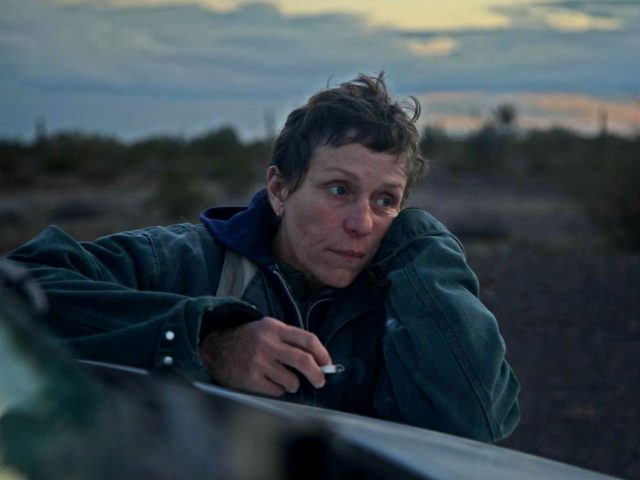Nomadland: Unhappy Camper, by David Bax

Chloé Zhao’s Nomadland opens roughly 100 miles north of Reno in one of the snowy, desolate and incomprehensibly beautiful parts of Nevada most of us tend to forget exist. When those who dwell in larger population centers daydream about going “off the grid,” this is one of the places they conjure up in their mind, whether they’ve actually seen it before or not. But, as the opening title cards inform us, what we’re seeing is also a place all but wiped off the map by economic ruin after the closing of the local mine. Nomadland is a movie about the picturesque places you’ll probably never see and the struggling inhabitants of those places you might not ever think about.
Frances McDormand stars as Fern, a widow whose late husband worked in that mine. After the town itself essentially dried up and blew away, she took to living in a van she customized herself. That’s where she is when we meet her, living in a campground near a temporary, seasonal job she’s found. When that job ends, she’ll go find another one and a place to park nearby.
She’ll meet new people when she relocates but she’ll also see some of the same faces again and again. Many of those faces on display here belong to people who actually live the same kind of life as Fern. Nomadland is based on a non-fiction book of the same name by Jessica Bruder, who chronicled the lives of Americans, many senior citizens, who travel from job to job across the land of endless horizons and limited opportunities.
Zhao and cinematographer Joshua James Richards–who collaborated on Zhao’s previous docudrama, The Rider–shot on location among the “nomads.” The empathy for these men and women’s precarious position sidesteps condescension by also inspiring envy at their daily lives under the vast and colorful sky.
So there’s an obvious temptation (especially when so many of us have been stuck in our homes for nearly a year) to romanticize the nomads, to see them as part of a tradition of untethered Americana, the pioneers of the 21st century. All it takes is one character actually vocalizing that sentiment, though, to realized how fucking stupid it sounds.
Just like we call essential workers “heroes” to assuage our guilt about the risks and low wages they face, glorifying the lifestyle of Fern and her ilk keeps you from feeling bad about the temporary Amazon employee working the night shift to make sure your last minute Christmas presents arrive on time. Zhao doesn’t try to deny that there’s a certain kind of freedom that comes with this life but it’s a freedom that requires dangling over a precipice. The only respite is the one found in community, among those who commune. Nomadland‘s dramatic tension comes from the question of whether Fern will allow herself to become one of them or if she’ll run out of gas alone somewhere down the road.



























